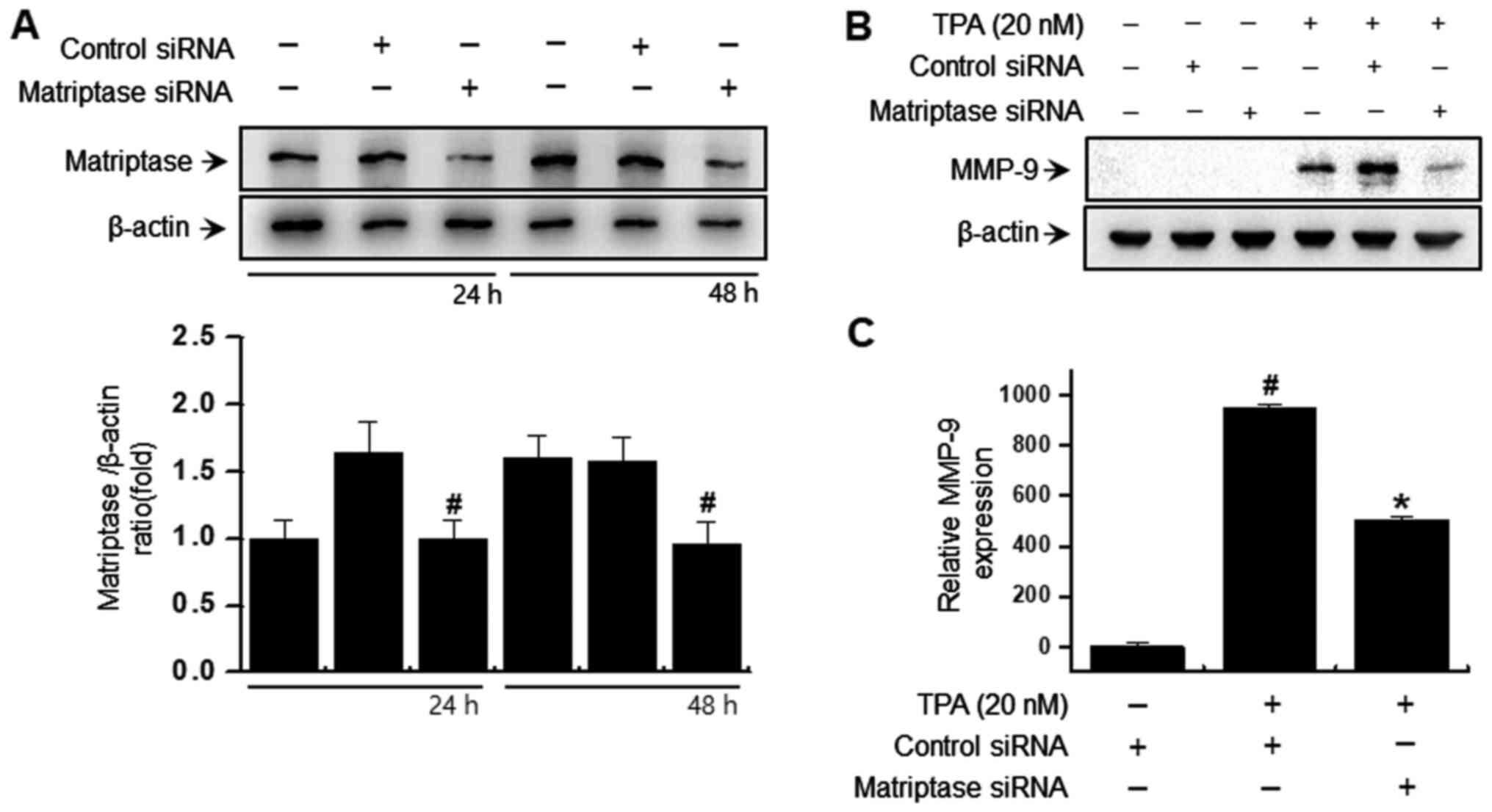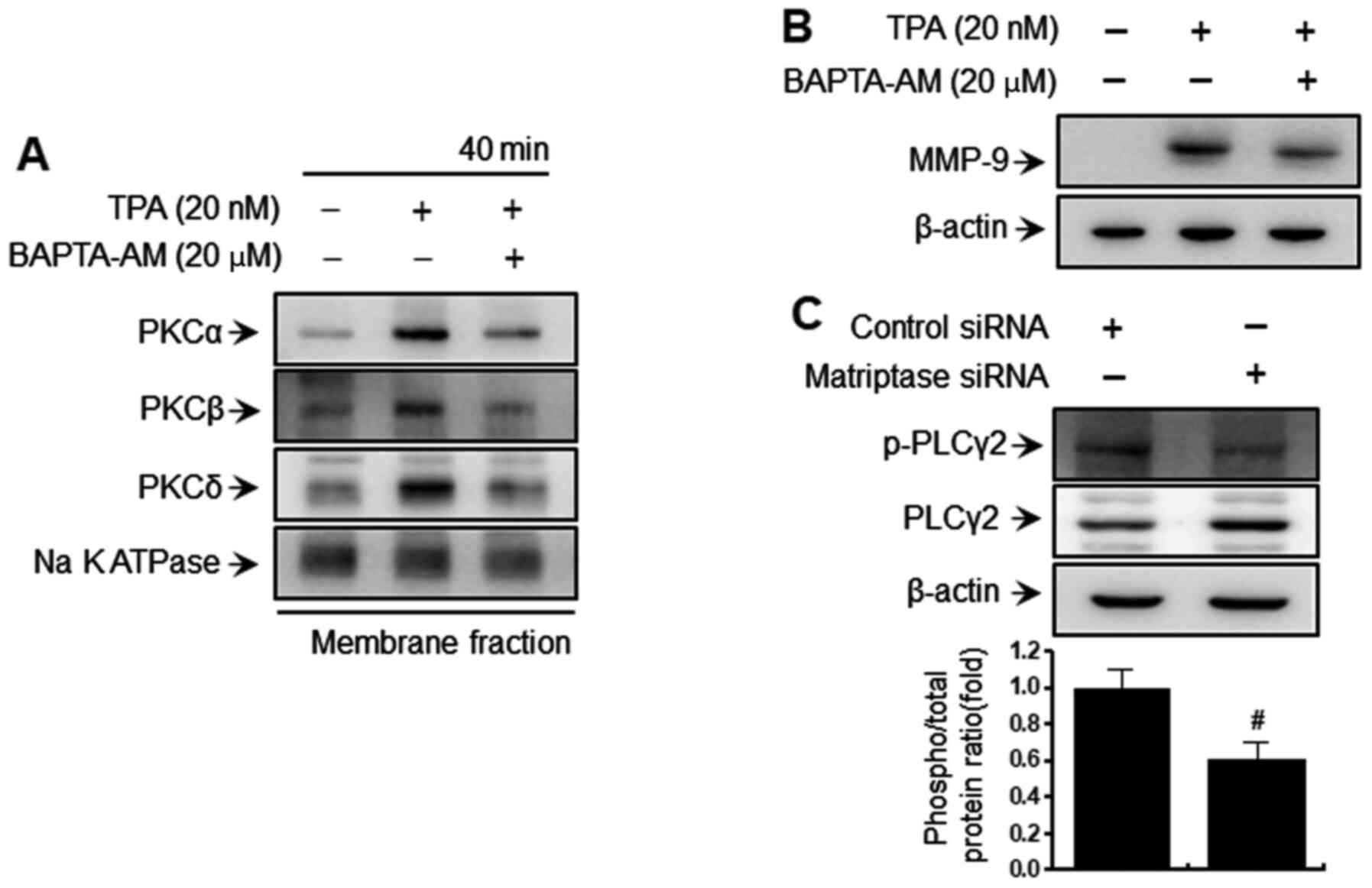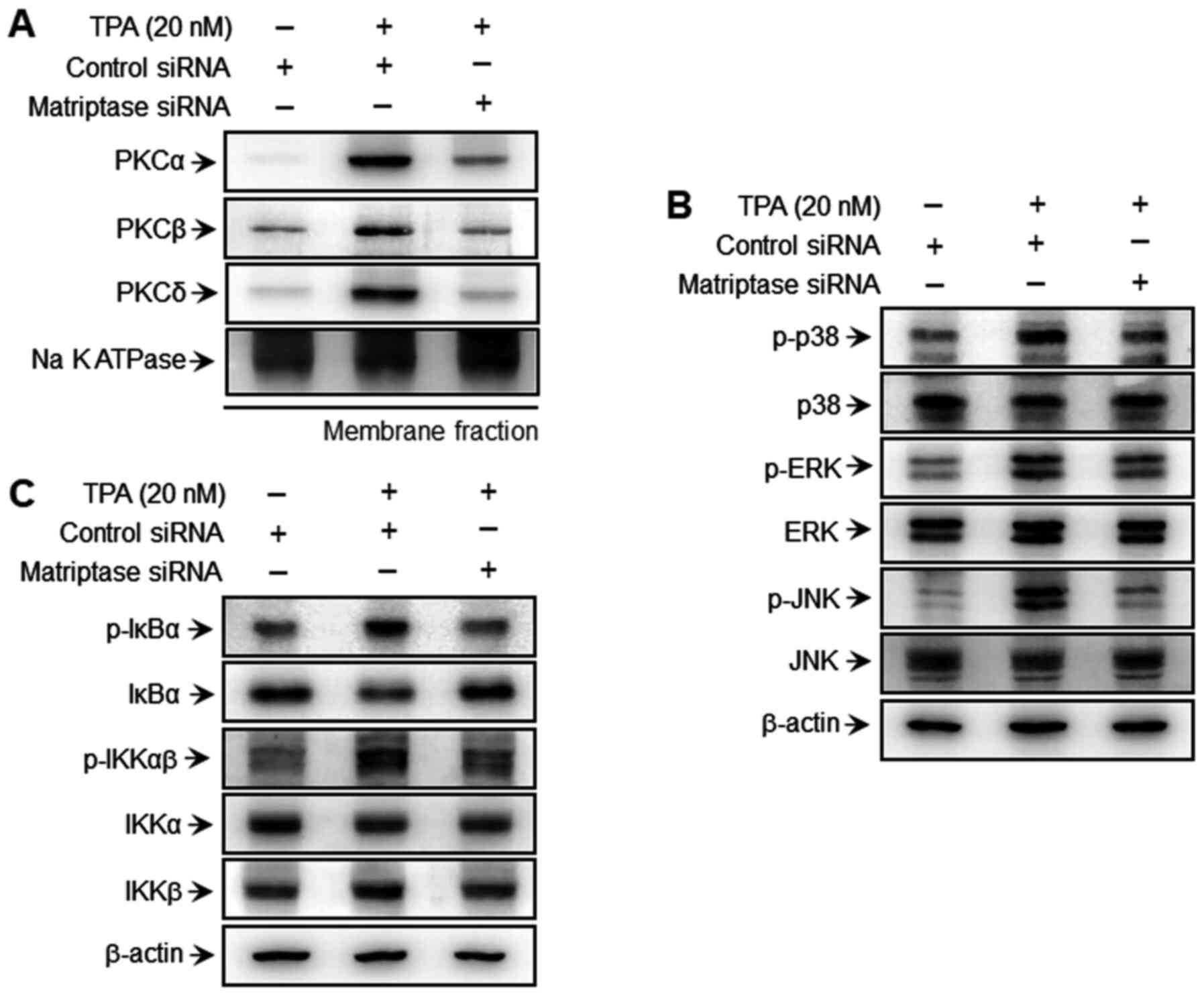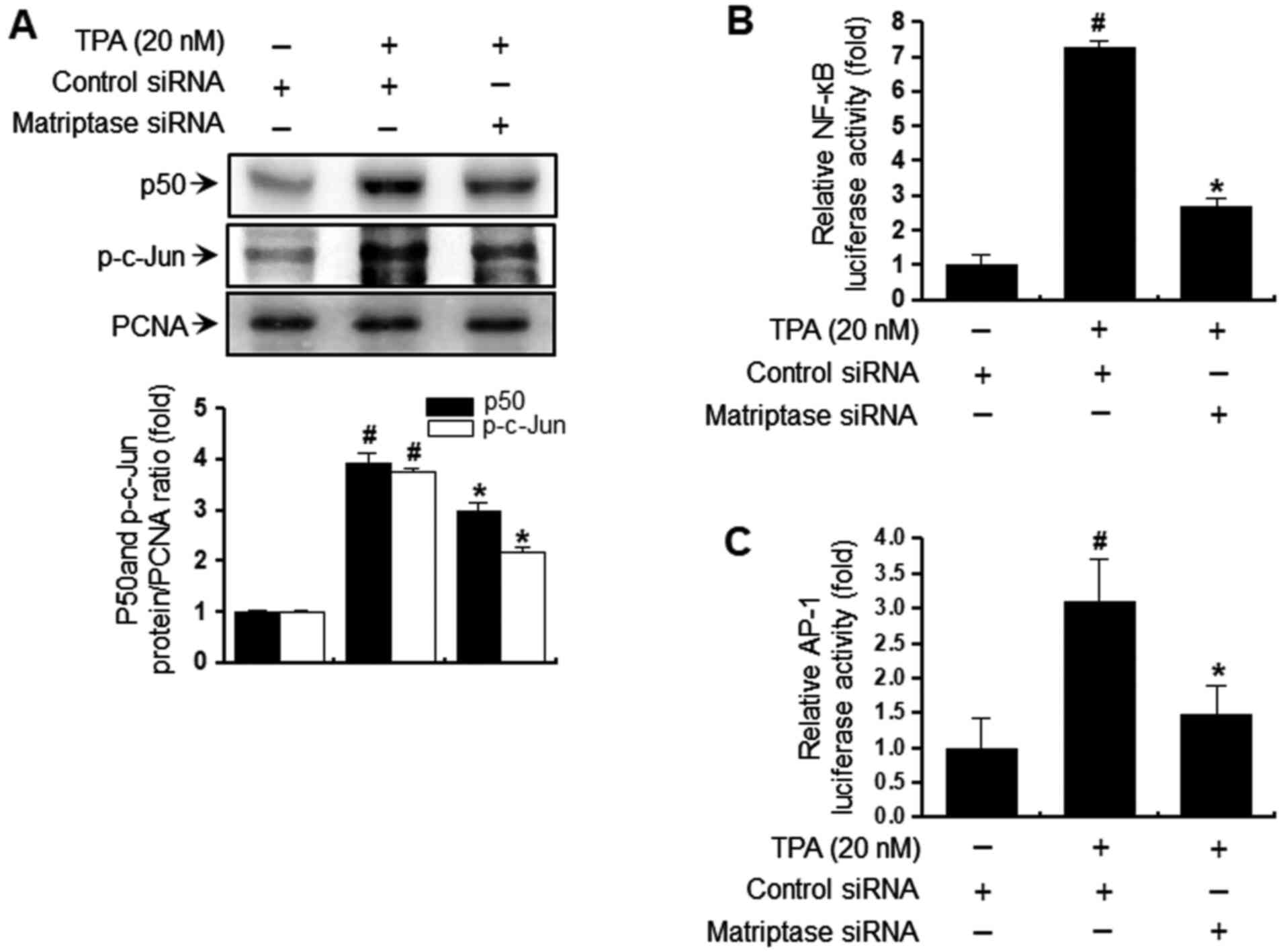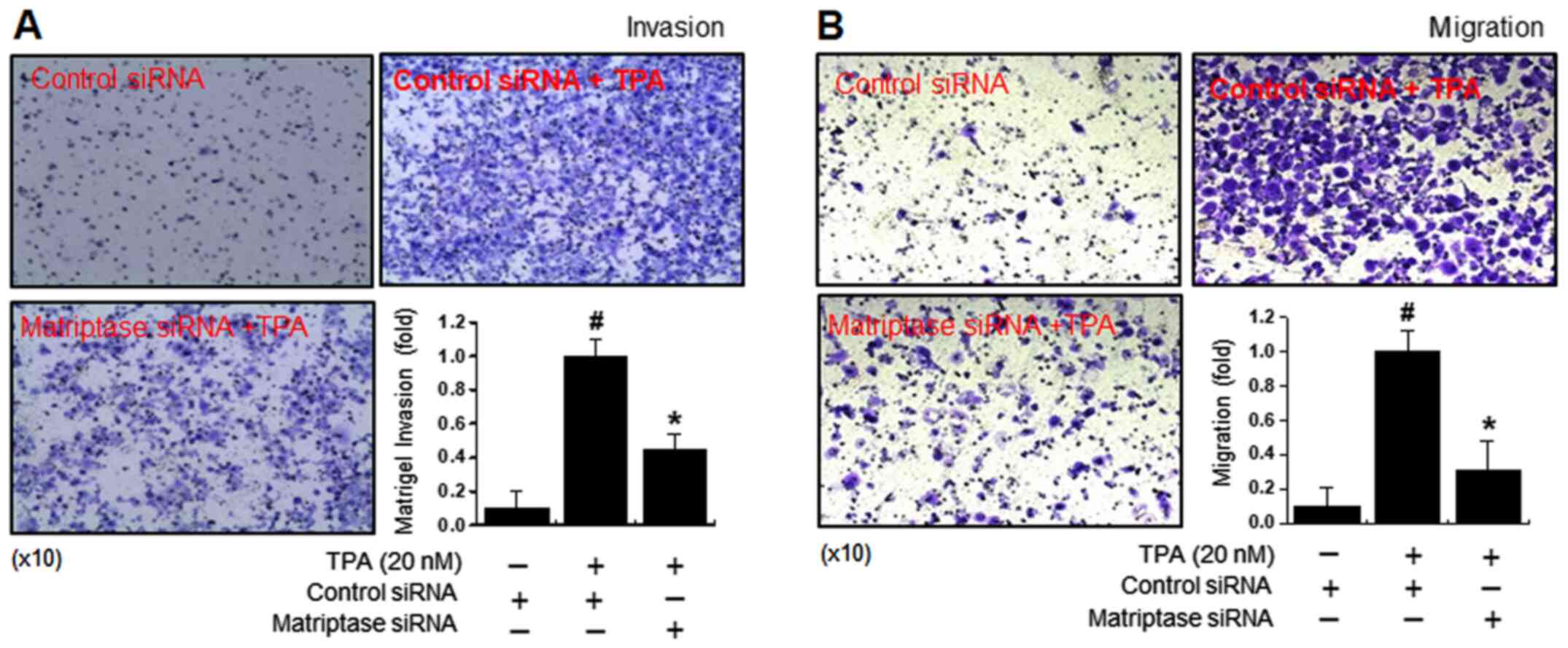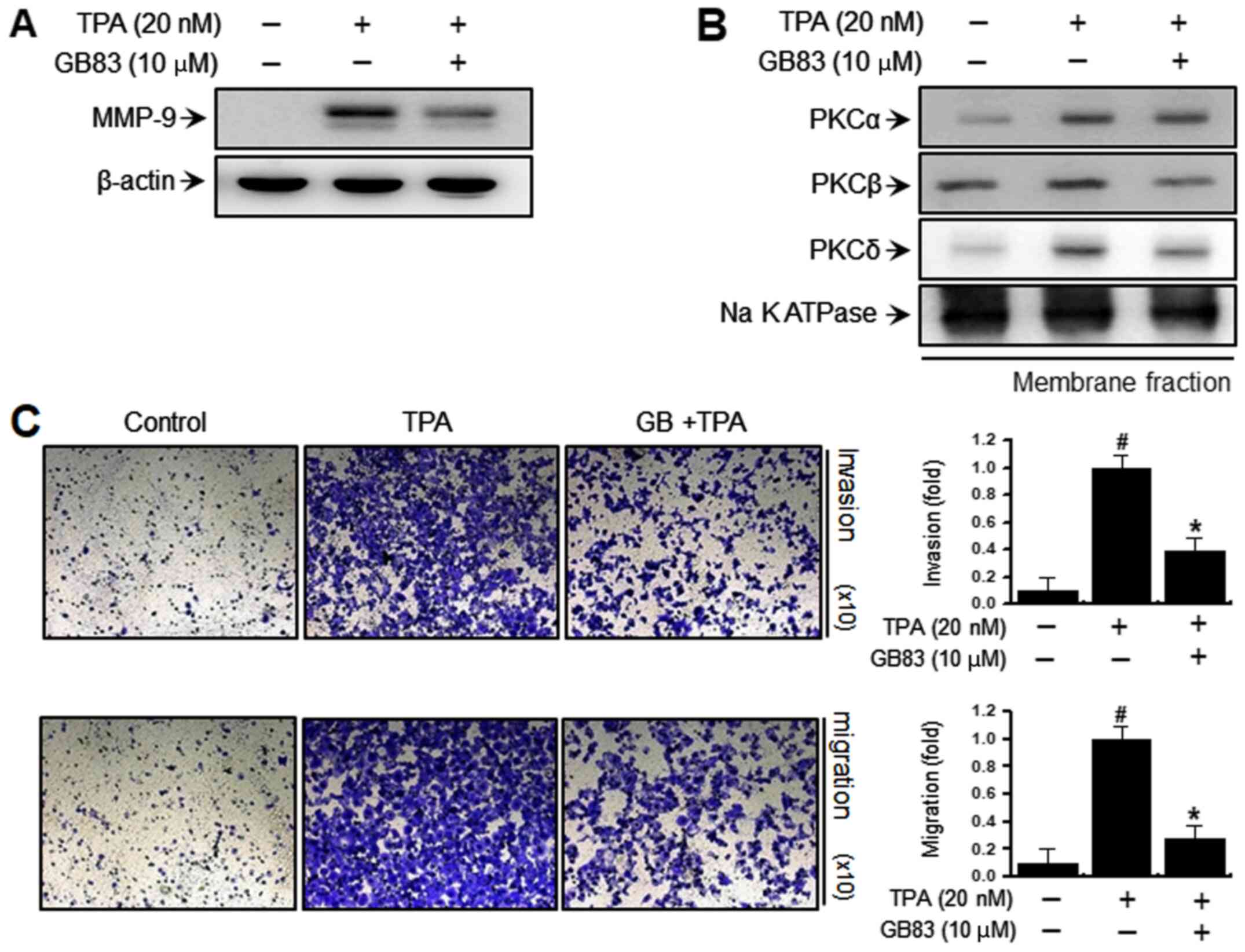|
1
|
Redig AJ and McAllister SS: Breast cancer
as a systemic disease: A view of metastasis. J Intern Med.
274:113–126. 2013. View Article : Google Scholar
|
|
2
|
Siegel R, Ma J, Zou Z and Jemal A: Cancer
statistics, 2014. CA Cancer J Clin. 64:9–29. 2014. View Article : Google Scholar
|
|
3
|
Leber MF and Efferth T: Molecular
principles of cancer invasion and metastasis (review). Int J Oncol.
34:881–895. 2009.
|
|
4
|
Jiang WG, Sanders AJ, Katoh M, Ungefroren
H, Gieseler F, Prince M, Thompson SK, Zollo M, Spano D, Dhawan P,
et al: Tissue invasion and metastasis: Molecular, biological and
clinical perspectives. Semin Cancer Biol. 35 (Suppl 1):S244–S275.
2015. View Article : Google Scholar
|
|
5
|
van Zijl F, Krupitza G and Mikulits W:
Initial steps of metastasis: Cell invasion and endothelial
transmigration. Mutat Res. 728:23–34. 2011. View Article : Google Scholar
|
|
6
|
Theocharis AD, Skandalis SS, Gialeli C and
Karamanos NK: Extracellular matrix structure. Adv Drug Deliv Rev.
97:4–27. 2016. View Article : Google Scholar
|
|
7
|
Szabo R and Bugge TH: Type II
transmembrane serine proteases in development and disease. Int J
Biochem Cell Biol. 40:1297–1316. 2008. View Article : Google Scholar
|
|
8
|
Murray AS, Varela FA and List K: Type II
transmembrane serine proteases as potential targets for cancer
therapy. Biol Chem. 397:815–826. 2016. View Article : Google Scholar
|
|
9
|
List K, Bugge TH and Szabo R: Matriptase:
Potent proteolysis on the cell surface. Mol Med. 12:1–7. 2006.
View Article : Google Scholar
|
|
10
|
Oberst M, Anders J, Xie B, Singh B,
Ossandon M, Johnson M, Dickson RB and Lin CY: Matriptase and HAI-1
are expressed by normal and malignant epithelial cells in vitro and
in vivo. Am J Pathol. 158:1301–1311. 2001. View Article : Google Scholar
|
|
11
|
Bergum C, Zoratti G, Boerner J and List K:
Strong expression association between matriptase and its substrate
prostasin in breast cancer. J Cell Physiol. 227:1604–1609. 2012.
View Article : Google Scholar
|
|
12
|
Tuhkanen H, Hartikainen JM, Soini Y,
Velasco G, Sironen R, Nykopp TK, Kataja V, Eskelinen M, Kosma VM
and Mannermaa A: Matriptase-2 gene (TMPRSS6) variants associate
with breast cancer survival, and reduced expression is related to
triple-negative breast cancer. Int J Cancer. 133:2334–2340. 2013.
View Article : Google Scholar
|
|
13
|
Parr C, Sanders AJ, Davies G, Martin T,
Lane J, Mason MD, Mansel RE and Jiang WG: Matriptase-2 inhibits
breast tumor growth and invasion and correlates with favorable
prognosis for breast cancer patients. Clin Cancer Res.
13:3568–3576. 2007. View Article : Google Scholar
|
|
14
|
Rattenholl A and Steinhoff M:
Proteinase-activated receptor-2 in the skin: Receptor expression,
activation and function during health and disease. Drug News
Perspect. 21:369–381. 2008. View Article : Google Scholar
|
|
15
|
Bao Y, Hou W and Hua B: Protease-activated
receptor 2 signalling pathways: A role in pain processing. Expert
Opin Ther Targets. 18:15–27. 2014. View Article : Google Scholar
|
|
16
|
Sales KU, Friis S, Konkel JE, Godiksen S,
Hatakeyama M, Hansen KK, Rogatto SR, Szabo R, Vogel LK, Chen W, et
al: Non-hematopoietic PAR-2 is essential for matriptase-driven
pre-malignant progression and potentiation of ras-mediated squamous
cell carcinogenesis. Oncogene. 34:346–356. 2015. View Article : Google Scholar
|
|
17
|
Wojtukiewicz MZ, Hempel D, Sierko E,
Tucker SC and Honn KV: Protease-activated receptors (PARs)-biology
and role in cancer invasion and metastasis. Cancer Metastasis Rev.
34:775–796. 2015. View Article : Google Scholar
|
|
18
|
Bocheva G, Rattenholl A, Kempkes C, Goerge
T, Lin CY, D'Andrea MR, Ständer S and Steinhoff M: Role of
matriptase and proteinase-activated receptor-2 in nonmelanoma skin
cancer. J Invest Dermatol. 129:1816–1823. 2009.Rothmeier AS and Ruf
W: Protease-activated receptor 2 signaling in inflammation. Semin
Immunopathol 34: 133–149, 2012. View Article : Google Scholar
|
|
19
|
Rothmeier AS and Ruf W: Protease-activated
receptor 2 signaling in inflammation. Semin Immunopathol.
34:133–149. 2012. View Article : Google Scholar
|
|
20
|
Lidington EA, Steinberg R, Kinderlerer AR,
Landis RC, Ohba M, Samarel A, Haskard DO and Mason JC: A role for
proteinase-activated receptor 2 and PKC-epsilon in
thrombin-mediated induction of decay-accelerating factor on human
endothelial cells. Am J Physiol Cell Physiol. 289:C1437–C1447.
2005. View Article : Google Scholar
|
|
21
|
van der Merwe JQ, Moreau F and MacNaughton
WK: Protease-activated receptor-2 stimulates intestinal epithelial
chloride transport through activation of PLC and selective PKC
isoforms. Am J Physiol Gastrointest Liver Physiol. 296:G1258–G1266.
2009. View Article : Google Scholar
|
|
22
|
Su S, Li Y, Luo Y, Sheng Y, Su Y, Padia
RN, Pan ZK, Dong Z and Huang S: Proteinase-activated receptor 2
expression in breast cancer and its role in breast cancer cell
migration. Oncogene. 28:3047–3057. 2009. View Article : Google Scholar
|
|
23
|
Jiang Y, Yau MK, Lim J, Wu KC, Xu W, Suen
JY and Fairlie DP: A potent antagonist of protease-activated
receptor 2 that inhibits multiple signaling functions in human
cancer cells. J Pharmacol Exp Ther. 364:246–257. 2018. View Article : Google Scholar
|
|
24
|
Stetler-Stevenson WG, Hewitt R and
Corcoran M: Matrix metalloproteinases and tumor invasion: From
correlation and causality to the clinic. Semin Cancer Biol.
7:147–154. 1996. View Article : Google Scholar
|
|
25
|
Itoh Y and Nagase H: Matrix
metalloproteinases in cancer. Essays Biochem. 38:21–36. 2002.
View Article : Google Scholar
|
|
26
|
Brinckerhoff CE and Matrisian LM: Matrix
metalloproteinases: A tail of a frog that became a prince. Nat Rev
Mol Cell Biol. 3:207–214. 2002. View
Article : Google Scholar
|
|
27
|
Lin CW, Hou WC, Shen SC, Juan SH, Ko CH,
Wang LM and Chen YC: Quercetin inhibition of tumor invasion via
suppressing PKC delta/ERK/AP-1-dependent matrix metalloproteinase-9
activation in breast carcinoma cells. Carcinogenesis. 29:1807–1815.
2008. View Article : Google Scholar
|
|
28
|
Lee SO, Jeong YJ, Kim M, Kim CH and Lee
IS: Suppression of PMA-induced tumor cell invasion by capillarisin
via the inhibition of NF-kappaB-dependent MMP-9 expression. Biochem
Biophys Res Commun. 366:1019–1024. 2008. View Article : Google Scholar
|
|
29
|
Saito N, Hatori T, Murata N, Zhang ZA,
Ishikawa F, Nonaka H, Iwabuchi S and Samejima H: A double
three-step theory of brain metastasis in mice: The role of the pia
mater and matrix metalloproteinases. Neuropathol Appl Neurobiol.
33:288–298. 2007. View Article : Google Scholar
|
|
30
|
Castellano G, Malaponte G, Mazzarino MC,
Figini M, Marchese F, Gangemi P, Travali S, Stivala F, Canevari S
and Libra M: Activation of the osteopontin/matrix
metalloproteinase-9 pathway correlates with prostate cancer
progression. Clin Cancer Res. 14:7470–7480. 2008. View Article : Google Scholar
|
|
31
|
Kanayama H: Matrix metalloproteinases and
bladder cancer. J Med Invest. 48:31–43. 2001.
|
|
32
|
Gum R, Wang H, Lengyel E, Juarez J and
Boyd D: Regulation of 92 kDa type IV collagenase expression by the
jun aminoterminal kinase- and the extracellular signal-regulated
kinase-dependent signaling cascades. Oncogene. 14:1481–1493. 1997.
View Article : Google Scholar
|
|
33
|
Newton AC: Regulation of protein kinase C.
Curr Opin Cell Biol. 9:161–167. 1997. View Article : Google Scholar
|
|
34
|
Zeigler ME, Chi Y, Schmidt T and Varani J:
Role of ERK and JNK pathways in regulating cell motility and matrix
metalloproteinase 9 production in growth factor-stimulated human
epidermal keratinocytes. J Cell Physiol. 180:271–284. 1999.
View Article : Google Scholar
|
|
35
|
Hozumi A, Nishimura Y, Nishiuma T, Kotani
Y and Yokoyama M: Induction of MMP-9 in normal human bronchial
epithelial cells by TNF-alpha via NF-kappa B-mediated pathway. Am J
Physiol Lung Cell Mol Physiol. 281:L1444–L1452. 2001. View Article : Google Scholar
|
|
36
|
Weng CJ, Chau CF, Hsieh YS, Yang SF and
Yen GC: Lucidenic acid inhibits PMA-induced invasion of human
hepatoma cells through inactivating MAPK/ERK signal transduction
pathway and reducing binding activities of NF-kappaB and AP-1.
Carcinogenesis. 29:147–156. 2008. View Article : Google Scholar
|
|
37
|
Noh EM, Park YJ, Kim JM, Kim MS, Kim HR,
Song HK, Hong OY, So HS, Yang SH, Kim JS, et al: Fisetin regulates
TPA-induced breast cell invasion by suppressing matrix
metalloproteinase-9 activation via the PKC/ROS/MAPK pathways. Eur J
Pharmacol. 764:79–86. 2015. View Article : Google Scholar
|
|
38
|
Kim JM, Noh EM, Kwon KB, Kim JS, You YO,
Hwang JK, Hwang BM, Kim BS, Lee SH, Lee SJ, et al: Curcumin
suppresses the TPA-induced invasion through inhibition of
PKCα-dependent MMP-expression in MCF-7 human breast cancer cells.
Phytomedicine. 19:1085–1092. 2012. View Article : Google Scholar
|
|
39
|
Karin M: The regulation of AP-1 activity
by mitogen-activated protein kinases. J Biol Chem. 270:16483–16486.
1995. View Article : Google Scholar
|
|
40
|
Madrid LV, Mayo MW, Reuther JY and Baldwin
AS Jr: Akt stimulates the transactivation potential of the RelA/p65
Subunit of NF-kappa B through utilization of the Ikappa B kinase
and activation of the mitogen-activated protein kinase p38. J Biol
Chem. 276:18934–18940. 2001. View Article : Google Scholar
|
|
41
|
Schmittgen TD and Livak KJ: Analyzing
real-time PCR data by the comparative C(T) method. Nat Protoc.
3:1101–1108. 2008. View Article : Google Scholar
|
|
42
|
Isakov N: Protein kinase C (PKC) isoforms
in cancer, tumor promotion and tumor suppression. Semin Cancer
Biol. 48:36–52. 2018. View Article : Google Scholar
|
|
43
|
Duffy MJ, Maguire TM, Hill A, McDermott E
and O'Higgins N: Metalloproteinases: Role in breast carcinogenesis,
invasion and metastasis. Breast Cancer Res. 2:252–257. 2000.
View Article : Google Scholar
|
|
44
|
Woessner JF Jr: Matrix metalloproteinases
and their inhibitors in connective tissue remodeling. FASEB J.
5:2145–2154. 1991. View Article : Google Scholar
|
|
45
|
Scorilas A, Karameris A, Arnogiannaki N,
Ardavanis A, Bassilopoulos P, Trangas T and Talieri M:
Overexpression of matrix-metalloproteinase-9 in human breast
cancer: A potential favourable indicator in node-negative patients.
Br J Cancer. 84:1488–1496. 2001. View Article : Google Scholar
|
|
46
|
Yousef EM, Tahir MR, St-Pierre Y and
Gaboury LA: MMP-9 expression varies according to molecular subtypes
of breast cancer. BMC Cancer. 14:6092014. View Article : Google Scholar
|
|
47
|
Shi YE, Torri J, Yieh L, Wellstein A,
Lippman ME and Dickson RB: Identification and characterization of a
novel matrix-degrading protease from hormone-dependent human breast
cancer cells. Cancer Res. 53:1409–1415. 1993.
|
|
48
|
Fan B, Brennan J, Grant D, Peale F,
Rangell L and Kirchhofer D: Hepatocyte growth factor activator
inhibitor-1 (HAI-1) is essential for the integrity of basement
membranes in the developing placental labyrinth. Dev Biol.
303:222–230. 2007. View Article : Google Scholar
|
|
49
|
Uhland K: Matriptase and its putative role
in cancer. Cell Mol Life Sci. 63:2968–2978. 2006. View Article : Google Scholar
|
|
50
|
Zoratti GL, Tanabe LM, Varela FA, Murray
AS, Bergum C, Colombo É, Lang JE, Molinolo AA, Leduc R, Marsault E,
et al: Targeting matriptase in breast cancer abrogates tumour
progression via impairment of stromal-epithelial growth factor
signalling. Nat Commun. 6:67762015. View Article : Google Scholar
|
|
51
|
Zhang J, Anastasiadis PZ, Liu Y, Thompson
EA and Fields AP: Protein kinase C (PKC) betaII induces cell
invasion through a Ras/Mek-, PKC iota/Rac 1-dependent signaling
pathway. J Biol Chem. 279:22118–22123. 2004. View Article : Google Scholar
|
|
52
|
de Vente JE, Kukoly CA, Bryant WO,
Posekany KJ, Chen J, Fletcher DJ, Parker PJ, Pettit GJ, Lozano G
and Cook PP: Phorbol esters induce death in MCF-7 breast cancer
cells with altered expression of protein kinase C isoforms. Role
for p53-independent induction of gadd-45 in initiating death. J
Clin Invest. 96:1874–1886. 1995. View Article : Google Scholar
|
|
53
|
Kim S, Han J, Lee SK, Choi MY, Kim J, Lee
J, Jung SP, Kim JS, Kim JH, Choe JH, et al: Berberine suppresses
the TPA-induced MMP-1 and MMP-9 expressions through the inhibition
of PKC-α in breast cancer cells. J Surg Res. 176:e21–e29. 2012.
View Article : Google Scholar
|
|
54
|
Barry OP and Kazanietz MG: Protein kinase
C isozymes, novel phorbol ester receptors and cancer chemotherapy.
Curr Pharm Des. 7:1725–1744. 2001. View Article : Google Scholar
|
|
55
|
Newton AC: Protein kinase C as a tumor
suppressor. Semin Cancer Biol. 48:18–26. 2018. View Article : Google Scholar
|
|
56
|
Wilde JI and Watson SP: Regulation of
phospholipase C gamma isoforms in haematopoietic cells: Why one,
not the other? Cell Signal. 13:691–701. 2001. View Article : Google Scholar
|
|
57
|
Koivunen J, Aaltonen V and Peltonen J:
Protein kinase C (PKC) family in cancer progression. Cancer Lett.
235:1–10. 2006. View Article : Google Scholar
|
|
58
|
Kim JM, Noh EM, Kwon KB, Kim JS, You YO,
Hwang JK, Hwang BM, Kim BS, Lee SH, Lee SJ, et al: Curcumin
suppresses the TPA-induced invasion through inhibition of
PKCα-dependent MMP-expression in MCF-7 human breast cancer cells.
Phytomedicine. 19:1085–1092. 2012. View Article : Google Scholar
|
|
59
|
Chakraborti S, Mandal M, Das S, Mandal A
and Chakraborti T: Regulation of matrix metalloproteinases: An
overview. Mol Cell Biochem. 253:269–285. 2003. View Article : Google Scholar
|
|
60
|
Qi M and Elion EA: MAP kinase pathways. J
Cell Sci. 118:3569–3572. 2005. View Article : Google Scholar
|
|
61
|
Yao J, Xiong S, Klos K, Nguyen N, Grijalva
R, Li P and Yu D: Multiple signaling pathways involved in
activation of matrix metalloproteinase-9 (MMP-9) by heregulin-beta1
in human breast cancer cells. Oncogene. 20:8066–8074. 2001.
View Article : Google Scholar
|
|
62
|
Whitmarsh AJ: Regulation of gene
transcription by mitogen-activated protein kinase signaling
pathways. Biochim Biophys Acta. 1773:1285–1298. 2007. View Article : Google Scholar
|
|
63
|
Eberhardt W, Huwiler A, Beck KF, Walpen S
and Pfeilschifter J: Amplification of IL-1 beta-induced matrix
metalloproteinase-9 expression by superoxide in rat glomerular
mesangial cells is mediated by increased activities of NF-kappa B
and activating protein-1 and involves activation of the
mitogen-activated protein kinase pathways. J Immunol.
165:5788–5797. 2000. View Article : Google Scholar
|















